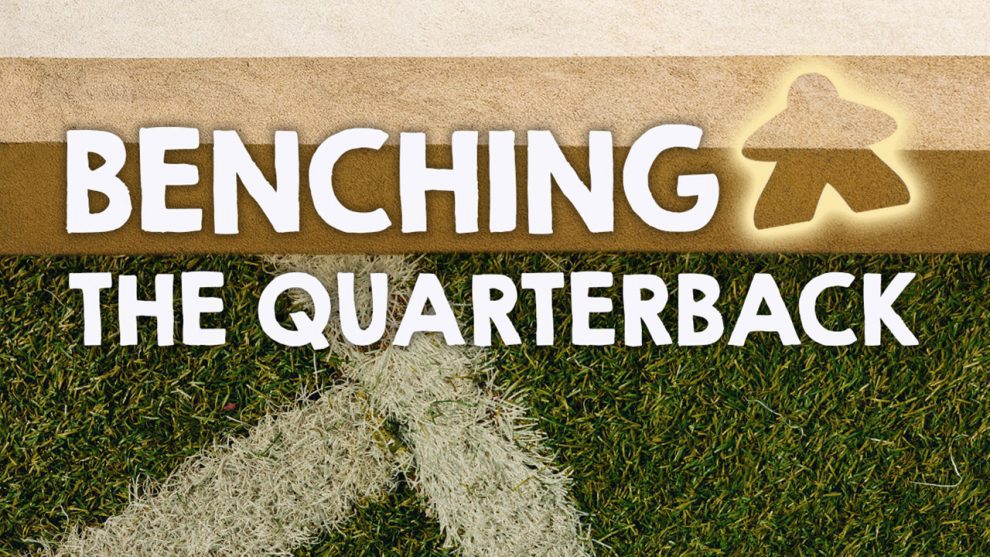The quarterback — also known as the alpha player or alpha gamer — is one of the most dreaded player types around. Entire games have been dismissed because they fall victim to “the quarterback problem”, causing many great cooperative games to go unplayed in households around the world. So what — or who — is the quarterback?
The quarterback is often a great strategist (or at least thinks they are), capable of reading the game state easily and intuiting the best way to solve it. They may also be the most experienced player in the game, making it easy for them to see nuances that other players don’t. Confident in their own assumptions, they begin enacting their brilliant plan by directing the other players’ actions. In the process, they turn a cooperative game into a solo game, treating the other players at the table as little more than extensions of their own game pieces.

It’s important to be clear: thinking strategically and taking the lead when the group is stuck are good traits to have…in moderation. Problems arise when a player goes from being a helpful team member to dominating the table. Learning how to avoid crossing that line is key to solving the quarterback problem.
The QB Spy
In most cases, the quarterback problem stems from the player rather than the game. Think about it: have you ever met anyone who was only a quarterback in one particular game? They’re pretty rare. In general, the player who takes over a game of Forbidden Desert is going to act the same way when you bust out Pandemic or Trogdor!! The Board Game. In fact, they’re often just as overbearing in competitive games, usually because they call out other players’ tactics as being inefficient or ineffectual instead of focusing on their own play. This behavior isn’t always intentional. In fact, the most common quarterback is the player who simply gets wrapped up in the game and stops paying attention to the social elements around it.
If you’re reading this, you might be wondering: how do I know if I’m a quarterback? A good way to tell would be to think back over the past few co-op games you played. Were there any significant debates or arguments over which strategy to use? Did everyone participate equally in those discussions? Was your strategy consistently implemented even when other strategies may have worked? Did you sometimes think of or portray yourself as smarter or better than your teammates? A good co-op experience should have a healthy, respectful give-and-take between all players, with no one person always getting their way.

It’s difficult to determine whether you’re quarterbacking in the heat of the moment, but glancing around the table from time to time can also help. If everyone’s frowning at you or rolling their eyes, you might be a quarterback. If there’s someone in the group that you feel comfortable discussing this with, you can ask that person after the game if your behavior was appropriate. Be sure to take this feedback graciously, even if it isn’t positive. Telling someone that you don’t like the way they play a game is extremely uncomfortable, so don’t make it any harder for them!
There’s No I in Team
Once you’ve realized that you might be a quarterback, it’s time to roll up your sleeves and make some major adjustments to your playstyle. This will take some time and conscious effort, so you’ll have to practice these skills every time you play.

First, and most importantly, accept that winning isn’t everything. The very nature of co-op games is that they are designed to be lost, with players building their familiarity with the game’s systems over several plays. The best co-op experiences start with a few rough losses before that thrilling moment when everything clicks and you sneak out a win, after which the game becomes a sort of recurring test of your skills. That trajectory is critical, and if players never get the chance to experiment with different strategies — even if those strategies fail — they’ll also never get the chance to develop the skills they need to consistently win.
To give players the opportunity to try those new ideas, consider taking a turn off periodically. If you’ve pushed for your preferred strategy for three straight rounds, let someone else take the lead on the fourth round, even if their idea doesn’t make sense to you. Maybe it’ll be a huge success! If it doesn’t work out, that’s okay too. Let it happen and then move on; don’t point out their failure or brag about how much better your plan might have been. Mistakes also add information to your understanding of the game, so treat it as a learning tool for everyone.
Lastly, one helpful tip that often works for me is to phrase my ideas in the form of a question, rather than an absolute statement. Instead of saying, “This is obviously the only way to win,” you can say, “I think this might work, but does anyone see another strategy?” Similarly, if you think the team might benefit from a certain player’s action, ask instead of tell: “What would happen if they moved here?” By inviting the other players to offer input everyone contributes to making the best plan: the essence of cooperative play.
Team Huddle
Unfortunately, even though quarterbacking is a single player’s problem, it affects everyone at the table. If you’re looking for tips on how to address the problem player, there are a few things that other members of the group can do to help break the quarterbacking habit.
The most important thing is to make sure everyone knows how to play the game before it starts. What often happens is that the player who knows the game best ends up quarterbacking because they are able to see key elements of play that the other players don’t yet recognize. That’s a lot less likely if everyone knows all the rules and can think through potential outcomes for themselves.

Another common sight is the group that suffers in silence, unwilling or unable to confront the quarterback. This can be a reinforcing cycle, where the quarterback asserts themselves because no one else seems to be making decisions, yet the other players can’t contribute because the quarterback is asserting control over the group.
Rather than fuming quietly, players should make sure that there are always at least two viable options every round. Even if the quarterback’s plan actually is the best, having a second option allows the group to explore the problem from different directions. This can also help players point out flaws in a given course of action. We’re all human, so even the cleverest player can overlook a crucial piece of information that could cause problems down the line, particularly since most cooperative games are designed to make players consider many different variables.
Having two or more plans for the round also makes it much easier to use the final tip: taking a vote. It can feel a little stilted, but calling for a group vote before taking action is a great way to make sure you’re all on the same page. If the vote is inconclusive or unearths an additional problem, keep talking things out until there’s a stronger consensus.
Game Day Decisions
If all else fails, you can try mixing up the co-op games you’re playing. Some co-ops make it more difficult, though not impossible, for any one player to dominate.
Semi-cooperative games, in which a player’s personal goals may conflict with the group’s goals, are often good for disrupting the quarterback. It’s much easier to shrug off their suggestions when you can’t be sure of their motives. Battlestar Galactica may have fallen out of favor somewhat, but it’s still the gold standard for semi-cooperative play. Titles like Dead of Winter, Dragonscales, and The Menace Among Us offer a similar experience.
Over the past few years, co-op games have increasingly used hidden information or limited communication to prevent one player from solving the whole puzzle. Hanabi remains one of the best-known games of this style, but The Mind and Letter Jam have also offered different takes on the same basic idea.
One last category to consider are timed co-op games. Having a real-world time limit placed on the game (as in Space Alert and Fuse) can actually turn the quarterback’s bad habits into a strength, letting them serve as the de facto leader but preventing them from digging too deep into the minutiae of the other players’ actions.
If It’s Fun, You’ve Won
If you’ve got a quarterback in your group — whether it’s you or someone else — always remember that the goal of any game is to have fun. Sometimes that means taking a break from a certain type of game or only playing them when the problem player isn’t around, and that’s okay. Not every type of game is good for every player or group. As long as everyone’s enjoying their experience, you’re doing it right!
Please note that the tips in this article are not designed to handle malicious or abusive players. Always prioritize your own well-being and remember that you have every right to leave a game if you cannot enjoy the experience.











Thanks for this! I have found myself quarterbacking a few times. I have tempered it greatly, but I do recognize this problem.
Your article is well written with solid advice (and brings up a few games I have not played, always a plus).